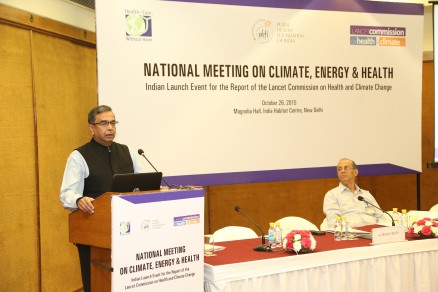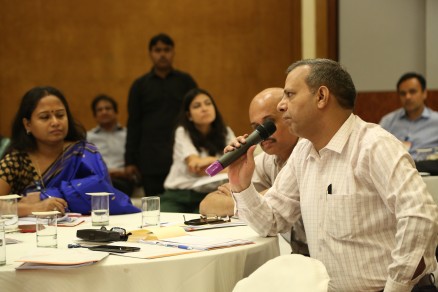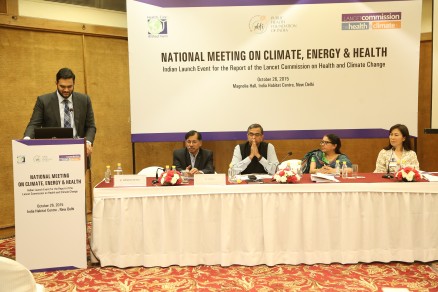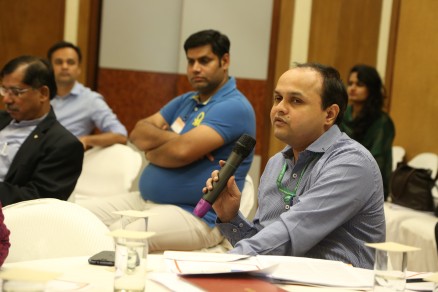Indian launch event for the report of the Lancet Commission on Health and Climate Change
October 26th, 2015 – India Habitat Centre, New Delhi
Report from the Public Health Foundation of India
 The National Meeting on Climate Change and Health was the Indian launch event for the report of the Lancet Commission on Health and Climate Change and was supported by Health Care without Harm (HCWH) and the Lancet Commission. The purpose of this meeting was to generate awareness about the health impacts of climate change, to emphasize the role of health professionals in raising awareness about the health impacts of our energy choices, and to discuss the multi-sectoral applicability of the Lancet Commission’s initiatives in an Indian context, set in the context of the upcoming United Nations climate negotiations in Paris in December 2015. The meeting convened leaders from India’s public health and medical communities as well as people working in the area of energy, trade, environment, meteorology and climate change to learn about the findings of the Lancet Commission from the study’s authors and culminated in the assessment of progress in the ongoing civic dialogue on science and policy.
The National Meeting on Climate Change and Health was the Indian launch event for the report of the Lancet Commission on Health and Climate Change and was supported by Health Care without Harm (HCWH) and the Lancet Commission. The purpose of this meeting was to generate awareness about the health impacts of climate change, to emphasize the role of health professionals in raising awareness about the health impacts of our energy choices, and to discuss the multi-sectoral applicability of the Lancet Commission’s initiatives in an Indian context, set in the context of the upcoming United Nations climate negotiations in Paris in December 2015. The meeting convened leaders from India’s public health and medical communities as well as people working in the area of energy, trade, environment, meteorology and climate change to learn about the findings of the Lancet Commission from the study’s authors and culminated in the assessment of progress in the ongoing civic dialogue on science and policy.
Themes Examined:
- Addressing the knowledge gap in impact assessment of climate change at both national and regional levels
- Existing health action plans need to be scaled up and customized to suit specific regional needs
- Understanding the repercussions of climate change and its role in initiating migration on a global scale, increasing disproportionate stress on existing resources.
- A lack of estimates and cutoff values for assessment of impact on climate change in regional health outcomes needs to be addressed
- Need for integrating meteorological data with valid and high quality health data to accurately model health impacts as a function of changes in the climate
- Importance of modifications in communication strategies to sensitize target groups for increasing the scope of impact, with a special emphasis on experiential learning in younger populations
- Importance of engaging health professionals in advocacy with non-health sectors (both government and private) to push for large-scale multi-sectoral action
- Search for collaborative strategies that engage multiple sectors to address the issue on a larger scale
 Highlights:
Highlights:
The meeting emphasized on the fact that not only is climate change a significant threat to global health, but could also be viewed as an opportunity for innovation and collaborations at international, national, local and personal levels, to combat the challenge. The prospect of collaborative ventures successfully managing changes in global trends in health seems especially promising in the light of instances of commendable steps taken at local levels (for example by the CHAI and AIIMS). In fact on the implementation of local solutions, participants felt that the health sector was ahead of the curve in recognizing the need to promote clean and sustainable energy sources, especially at a small scale. This needs to be scaled up to institution or sector-wide awareness to have far greater impact, with case studies from individual organizations providing an excellent base case.
A need for generation of valid and nationally representative databases on environmental epidemiology attributable to climate change is essential for development of region specific disease mitigation and management plans. This is especially true with respect to changes in distribution patterns of both chronic and infectious diseases. Where infectious disease patterns seem to be undergoing a geographic transition, chronic diseases have started to vary as a function of socio economic status and , unsurprisingly, consumption patterns, both of which are indirectly tied to a demographic’s role in exacerbating emissions and consequently climate change.
At the national level, goals for progress and parameters for continuous monitoring can be established through mechanisms such as Intended Nationally Determined Contributions and through policy actions such as a mission on climate change and health, through the inclusion of health across all sectors (particularly in critically polluted areas). A significant road block often encountered in this context is the fact that public opinion on the issue of climate change and health is without discourse, something participants of the workshop hoped to effect a change in.
 At the international level, effort aimed at negotiations on the issue, with respect to setting fresh targets is often diluted due to lack of enforcement measures, compounded by a paucity of financing and technology transfer mechanisms. International trade regimes play a pivotal role in incentivizing technological development, directly affecting the rate of technology development, transfer or promotion. High rates of protection, would directly reduce incentives to bring down the cost of developing technology. Also, trade policies that incentivize domestic technology development and therefore bring down the cost of development need to be encouraged, with a view to encouraging wider adoption. Keeping climate change and its widespread impact in perspective, a need to take optimize and reframe trade regimes to streamline technology development is crucial.
At the international level, effort aimed at negotiations on the issue, with respect to setting fresh targets is often diluted due to lack of enforcement measures, compounded by a paucity of financing and technology transfer mechanisms. International trade regimes play a pivotal role in incentivizing technological development, directly affecting the rate of technology development, transfer or promotion. High rates of protection, would directly reduce incentives to bring down the cost of developing technology. Also, trade policies that incentivize domestic technology development and therefore bring down the cost of development need to be encouraged, with a view to encouraging wider adoption. Keeping climate change and its widespread impact in perspective, a need to take optimize and reframe trade regimes to streamline technology development is crucial.
 Climate change and its role in erratic frost and rainfall patterns, poses a serious challenge to food security and agriculture. The Global Panel on Agriculture and Food Systems on Nutrition has reported that the World Bank and the Food and Agriculture Organization of the United Nations have discussed a three-fold advantage of adapting agriculture to climate change. These potential advantages from a successful adaptation include increased productivity and farm based incomes, enhanced community resilience and reduced vulnerability to shocks and reducing emissions.
Climate change and its role in erratic frost and rainfall patterns, poses a serious challenge to food security and agriculture. The Global Panel on Agriculture and Food Systems on Nutrition has reported that the World Bank and the Food and Agriculture Organization of the United Nations have discussed a three-fold advantage of adapting agriculture to climate change. These potential advantages from a successful adaptation include increased productivity and farm based incomes, enhanced community resilience and reduced vulnerability to shocks and reducing emissions.
Another area that requires attention, particularly in terms of mobilizing sustained public sensitization and local level advocacy is the means of communicating information and generating awareness. Stress needs to be laid on health as the domain which is to take primary responsibility for sustained initiatives.
Recent initiatives in India at the central government level include the introduction of a new mission on Health, as part of the Prime Minister’s Mission on Climate Change and the constitution of the expert group on the health impacts, with a six month duration for presentation of evidence. This is reflective of a much nuanced understanding at the higher levels of governance, however the leadership shown by the Prime Minister’s Office needs to be translated across sectors where the recognition of the issue as a high priority challenge, is still weak.
* * *
For additional reporting on this event from Dr. Adithya Pradyumna of SOCHARA, click here.



